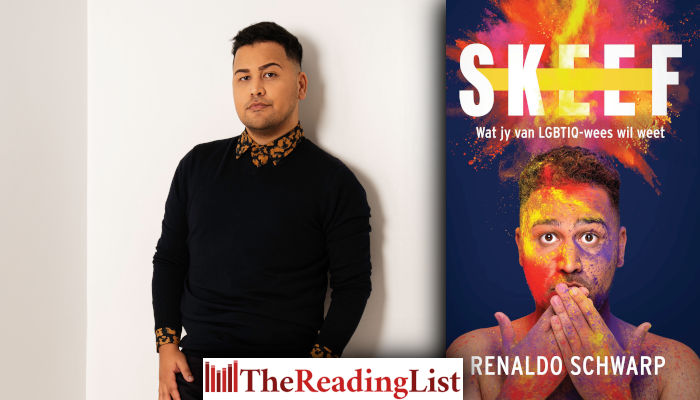Celebrating the LGBTIQ+ people whose stories freed us – Skeef author Renaldo Schwarp writes what’s on his mind
More about the book!

Retelling our story on our own terms enables us to develop a greater awareness about our identity and those of others, says media personality and Skeef author Renaldo Schwarp.
Questions of heritage and identity have never been as straightforward as they might first appear. And yes this pun was unapologetically intended!
Perhaps the first and best place to start addressing these topics is by acknowledging that in a country like South Africa, there is not one heritage or an easily delineated set of distinct identities. Our cultures, languages, and histories are multiple, diverse, and as dynamic as the colours of the rainbow.
For LGBTIQ+ people these questions often become even more difficult to navigate.
Gay. Brown. Afrikaans.
Three words that best describe my identity. Over the years, this sequence might have looked different, but the above-mentioned three definitive words stand core to my identity and the lens through which I experience the world. These three things shape me – all at the same time and not one before the other.
During the process of writing my debut book, Skeef, the concept of intersectionality came into sharp focus. In its most basic form, intersectionality demonstrates a multifaceted connection between race, gender and other systems that work together to oppress some while allowing privilege to others.
In 1990, during South Africa’s first Pride march, LGBTIQ trailblazer Simon Nkoli poignantly expressed why race and sexuality fundamentally can’t be divorced: ‘I am black and I am gay … In South Africa, I am oppressed because I am a black man, and I am oppressed because I am gay. So when I fight for my freedom I must fight against both oppressions.’
In a country like South Africa, there is not one heritage or an easily delineated set of distinct identities.
It’s exactly 31 years since the first Pride was held in Johannesburg and Nkoli’s words on intersectionality have become more important than ever before. That is why it was important for me to write Skeef in the context of the discrimination and conservatism of the Afrikaans community. My community. My gay identity cannot be removed from my Afrikaans identity. These are intertwined and will be forever.
The LGBTIQ+ community is often bombarded with cultural and societal limitations around our sexuality and identity versus our heritage. The question as to how LGBTIQ+ people celebrate our heritage often pops up. Now I’m sure there have been many panel discussions held about this and think pieces penned around this topic, but the answer to this question is actually quite simple for me … By unashamedly centring our lived experiences and retelling our story – on our own terms.
In doing so it helps us examine our history and traditions, and it enables us to develop a greater awareness about our identity and those of others. It also affords us the opportunity to see our current struggles and triumphs in a greater context.
So this Heritage month, I’ll be celebrating LGBTIQ+ people – present and past. People whose stories fill the pages of Skeef. People like Simon Nkoli, Kewpie and many others. Their contributions allowed us a lot of the freedom we have today; freedom that many other LGBTIQ+ people around the world aren’t afforded.
This article was originally published in The Penguin Post, a magazine from Penguin Random House South Africa.
Categories Afrikaans Non-fiction South Africa
Tags Column LAPA LAPA Uitgewers LGBTIQ On my mind Penguin Random House SA Renaldo Schwarp Skeef The Penguin Post
